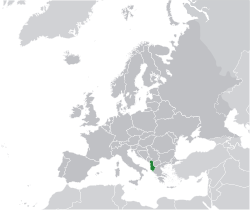NATO Boosts Albania Security, Armed Forces
By SETimes
By Erl Murati
Since the beginning of NATO-Albania relations in 1992, the country has dramatically reformed and improved its armed forces, its security provisions and, as a result, its economy.
Thanks to reform efforts, making the country’s armed forces more professional, more than 5,000 Albanian soldiers have been involved in five countries as part of NATO, UN and EU international missions.

“With its contributions in international operations we can say that Albania has transformed entirely from a country that consumes security [to] a country generating security,” Reserve Colonel Thimi Hudhra, chief of the Defense Analysis Centre, told SETimes.
NATO-Albania relations began in 1992, when Albania joined the North Atlantic Co-operation Council and expanded when the country joined the Partnership for Peace in 1994. NATO allies signed protocols on Albania’s accession on July 9th, 2008 and the country became a full member of the Alliance on April 1st, 2009.
“When we talk of reforms in defense and civil-military relations, NATO’s influence is obvious and undisputable. NATO membership not only did solve our security dilemmas but also guaranteed the so-desired western vocation of Albania,” Ilir Gjoni vice chairman of the Parliamentary Security Committee, told SETimes.
In addition, the country has made progress in destroying leftover stockpiled munitions, which are a security risk.
Albania’s communist history was marked by a massive build-up in munitions and weapons of Albanian, Chinese and Soviet origin. Hundreds of depots were placed across Albania, holding more than 100,000 tonnes of munitions.
This enormous arsenal of never-used weapons degraded over time and became hazardous to those living nearby. A defining moment occurred on March 15th, 2008, when an explosion at an ammunitions dismantling plant in Gerdec killed 26 people.
“Since that day, security has been our priority,” Deputy Defence Minister Ekrem Spahiu told SETimes. “[More than] 60,982 tonnes of ammunition was demilitarised from September 2009 to April 30th, 2012. Around 31,000 tonnes are left to go. At this pace, the entire demilitarisation process will end within the 2013 [timeframe],” Spahiu said.
Due to the increased safety, Albania’s officials say NATO integration has also increased tourist flow and foreign investments.
“NATO membership has brought also a flow of tourists in unseen levels before. For the first time in my life this summer I have seen in Albania [a] group of tourists with a flag-carrying guide,” Arjan Starova, deputy minister of defense, told SETimes.
In August 2012, Prime Minister Berisha said this year set a new record in the number of tourists in Albania, as about 3 million visitors were in the country, compared to 2.7 million last year.
According to Tourism, Cultural Affairs, Youth and Sports Minister Aldo Bumçi, 51,000 new jobs were created this year due to tourism. The sector’s growth has contributed 2.1 billion euros to the economy, or 21 percent of the GDP.
In September, NATO Secretary-General Anders Fogh Rasmussen thanked Albania President Bujar Nishani for his country’s contribution to the alliance.
“As a young member of our alliance, Albania can be an example for the whole region,” Rasmussen said.
Contrary to most issues, NATO integration has full support from all of the country’s political parties.
